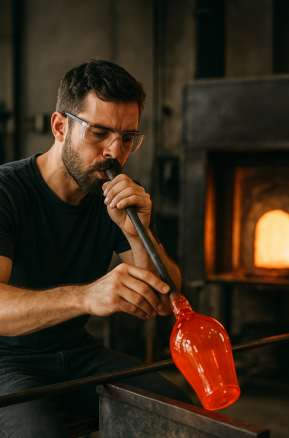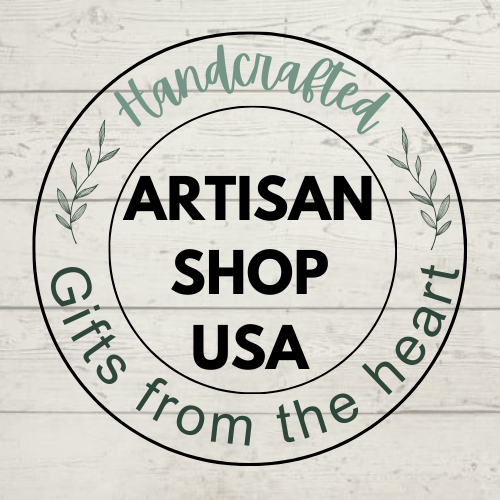
Why Handmade Hobbies Are Thriving Today
Share
From woodworking to metalwork, soap-making to cottage food products, creative hobbies that produce something tangible and useful have always held a special place in American culture. These aren’t just ways to pass the time—they build skill, patience, and character. They also give people a chance to stand apart in a world where mass production often feels like the default.
And yet, with so much technology and convenience at our fingertips, a question naturally comes up: Are handmade items on their way out—or are we actually seeing them make a strong comeback?
Handmade is Having a Moment

Walk into any big box store and you’ll find aisles of mass-produced goods. But if you pay attention to where people are actually shopping—farmers’ markets, artisan fairs, and curated online platforms—you’ll notice something different. Consumers young and old are leaning toward goods that are natural, sustainable, and unique.
They want more than just “stuff.” They want the story behind it. They want to know what went into the soap they’re buying, or who baked the loaf of bread on the table. They’re looking for quality, authenticity, and transparency.
According to a report by Yahoo Finance, the handicraft market is poised for exponential growth, projected to reach USD 427.71 billion by 2025, driven by increasing consumer demand for locally-sourced, artisanal goods (finance.yahoo.com).
That’s exactly where Artisan Shop USA comes in—connecting American makers directly with customers who value originality and craftsmanship, all without any upfront costs and with very low fees, making it an affordable way to grow your handmade business.
When to Begin
The great thing about hands-on hobbies is that there’s no single “right” age to start. Soap-making and cottage food products often appeal to adults who enjoy mixing creativity with practicality. Woodworking and metalwork take more tools and patience, so they tend to suit older teens and adults who are ready to focus on precision and safety.

Painting, of course, is open to everyone—kids, teens, and adults alike can dive in at their own level. And by the time someone takes on more intricate crafts like quilting, they’ve usually picked up life lessons along the way: persistence, planning, and a willingness to embrace mistakes as part of the journey.
What These Crafts Build in Us
Making something from scratch is a completely different experience from repurposing or reselling. It requires vision, follow-through, and a steady hand. A soap-maker has to carefully balance ingredients and test fragrances. A woodworker learns accuracy with each cut. A baker selling cottage food items balances creativity with consistency.
Each skill builds responsibility, patience, and problem-solving—qualities that spill over into daily life.
Engaging in creative activities has been shown to reduce stress and anxiety, improve mood, and even affect how our brains work. According to Bupa UK, creative outlets not only help to reduce feelings of stress and loneliness but can improve your mood and even affect how your brain works (bupa.co.uk).
Why the Trend Matters Now
Younger generations especially are fueling this return to handmade goods. They’re willing to pay a little more for products that feel real, sustainable, and one-of-a-kind. Instead of cookie-cutter items, they want pieces with personality—whether it’s a handcrafted metal sculpture, a loaf of bread fresh from someone’s kitchen, or a quilt made with care.

The U.S. market for handmade goods is estimated to be worth over $268 billion, and it is expected to grow by about 9.8% each year for the next five years (customcy.com).
Beyond the Nine-to-Five
For many makers, these hobbies aren’t just relaxing—they also provide income. A person who creates soap, jewelry, or baked goods can often turn that passion into profit, whether as a side hustle or even a full-fledged business.
Unlike a traditional nine-to-five, creative work offers freedom and flexibility. It also brings community, as artisans connect directly with buyers who truly appreciate their work.
Retirees, for example, are finding innovative and fulfilling ways to turn their hobbies into income-generating ventures. From puzzle-solving to painting, photography, and gardening, retirees are leveraging their passions to boost retirement savings, enrich their quality of life, and stay mentally active (investopedia.com).
MLMs vs. Making Something Real
A generation ago, multilevel marketing companies offered people—especially women at home—a way to earn money. However, the reality is stark: according to a 2024 FTC report analyzing 70 MLM income disclosure statements, the majority of participants earn $1,000 or less annually, with many reporting no earnings at all (ftc.gov). The New York Post also reports that roughly 99% of MLM participants do not profit and often lose money instead (nypost.com).
Today, fewer younger folks are drawn to that model. Instead, many prefer to put time and energy into making something with their own hands—candles, furniture, jams, soaps. It’s a shift toward authenticity, independence, and creativity, and away from scripted sales structures.
The Deeper Value of Making

There’s something powerful about becoming proficient at making something of purpose. It boosts confidence, instills pride, and gives a sense of meaning. Whether it’s a teenager learning woodworking, an adult mastering soap-making, or a retiree diving into quilting, the rewards are the same. Age doesn’t limit the impact—it just changes the way creativity shows up in a person’s life.
Creative hobbies have been found to be beneficial for mental health, especially if an individual considers their hobby an important part of their identity (pmc.ncbi.nlm.nih.gov).
In Closing
Handmade hobbies aren’t disappearing—they’re gaining ground. In a world hungry for authenticity and sustainability, handmade items are more than just products. They’re stories, connections, and reflections of the people who create them.
And beyond any profit, they shape the makers themselves—teaching patience, building character, and offering purpose at every stage of life.
Ready to share your craft with the world? Join Artisan Shop USA today and connect with customers who value the skill, creativity, and heart you put into every item. With no upfront costs and low fees, it’s never been easier to turn your passion into a meaningful business. Learn more and get started here!
![]()

I’m Lauren—a writer, educator, and novelty quilter with over 30 years of experience in service and sales. I’ve taught high school English and worked as a local journalist and now channel my passion for craftsmanship as the founder of Artisan Shop USA, a marketplace that supports vendors of handmade artistry and the sharing of faith, family and country. I’m also a proud wife, mom, bulldog caretaker, and lifelong lover of beauty and storytelling.
